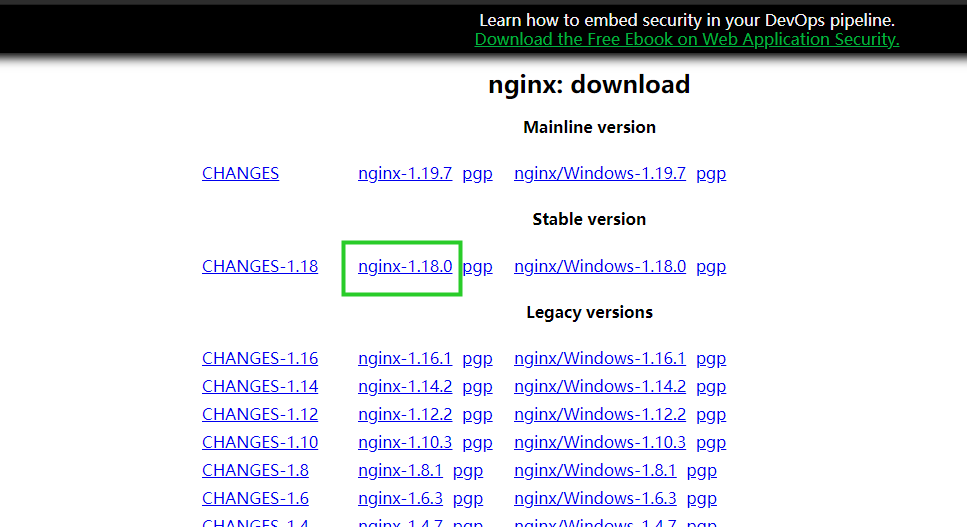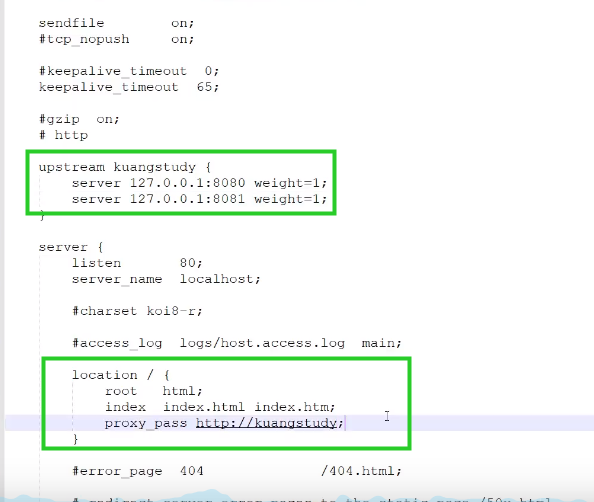Nginx 是一个高性能的Http和反向代理的Web服务器。
代理服务器
正向代理:可以隐藏客户端。 例:客户端通过访问VPN 去访问服务器。
反向代理:可以隐藏原始服务器。例:访问域名 ,域名可能对应多个服务器
Nginx提供负载均衡策略
内置策略:轮询、加权轮询、iphash(根据客户的ip获取hashCode,分配到指定服务器)
动静分离
把不需要后台处理的请求和静态资源(如:css,js,html,image等),可以做缓存操作,提高资源响应速率。
Linux 下载

wget http://nginx.org/download/nginx-1.18.0.tar.gz
tar -xvzf nginx-1.18.0.tar.gz -C /home/nginx
# 安装 (保存有问题,参考 https://blog.csdn.net/hybaym/article/details/50929958)
[root@iZwz9b8v7o84uupjlhulipZ nginx-1.18.0]# pwd
/home/nginx/nginx-1.18.0
[root@iZwz9b8v7o84uupjlhulipZ nginx-1.18.0]# ./configure # 自动配置
#[root@iZwz9b8v7o84uupjlhulipZ nginx-1.18.0]# ./configure --prefix=/usr/local/nginx # 手动指定配置位置
make install
# 安装成功后查找安装位置
[root@iZwz9b8v7o84uupjlhulipZ nginx-1.18.0]# whereis nginx
nginx: /usr/local/nginx
# 启动nginx
[root@iZwz9b8v7o84uupjlhulipZ sbin]# pwd
/usr/local/nginx/sbin
[root@iZwz9b8v7o84uupjlhulipZ sbin]# ./nginx #重动
[root@iZwz9b8v7o84uupjlhulipZ sbin]# ./nginx -s reload #重启(修改配置文件需要重启)
[root@iZwz9b8v7o84uupjlhulipZ sbin]# ./nginx -s quit #安全退出
[root@iZwz9b8v7o84uupjlhulipZ sbin]# ./nginx -s stop #停止
[root@iZwz9b8v7o84uupjlhulipZ sbin]# ps aux|grep nginx #查看nginx进程
负载均衡配置

执行 ./configure报错时:
错误提示:
./configure: error: the HTTP rewrite module requires the PCRE library.
安装pcre-devel与openssl-devel解决问题
yum -y install pcre-devel openssl openssl-devel
nginx 的配置文件
#运行用户
#user nobody;
#开启进程数 <=CPU数
worker_processes 1;
#错误日志保存位置
#error_log logs/error.log;
#error_log logs/error.log notice;
#error_log logs/error.log info;
#进程号保存文件
#pid logs/nginx.pid;
#等待事件
events {
#Linux下打开提高性能
#use epoll;
#每个进程最大连接数(最大连接=连接数x进程数)
worker_connections 1024;
}
http {
#文件扩展名与文件类型映射表
include mime.types;
#默认文件类型
default_type application/octet-stream;
#日志文件输出格式 这个位置相于全局设置
#log_format main '$remote_addr - $remote_user [$time_local] "$request" '
# '$status $body_bytes_sent "$http_referer" '
# '"$http_user_agent" "$http_x_forwarded_for"';
#请求日志保存位置
#access_log logs/access.log main;
#设定请求缓冲
client_header_buffer_size 1k;
large_client_header_buffers 4 4k;
#打开发送文件
sendfile on;
#tcp_nopush on;
#keepalive_timeout 0;
keepalive_timeout 65;
#客户端上传文件大小控制
client_max_body_size 8m;
#打开gzip压缩
#gzip on;
#gzip_min_length 1000;
#gzip_types text/plain text/css application/x-javascript;
#设定负载均衡的服务器列表
upstream mysvr {
#weigth参数表示权值,权值越高被分配到的几率越大
#根据ip计算将请求分配各那个后端tomcat,许多人误认为可以解决session问题,其实并不能。
#同一机器在多网情况下,路由切换,ip可能不同
server 127.0.0.1:8080 weight=10;
#server 127.0.0.1:8090 weight=2;
}
#第一个虚拟主机
server {
#监听IP端口
listen 80;
#主机名
server_name localhostName;
#root
#设置字符集
#charset koi8-r;
#本虚拟server的访问日志 相当于局部变量
#access_log logs/host.access.log main;
#日志文件输出格式
#log_format main '$remote_addr - $remote_user [$time_local] "$request" '
# '$status $body_bytes_sent "$http_referer" '
# '"$http_user_agent" "$http_x_forwarded_for"';
location / {
root html;
index index.html index.htm;
proxy_pass http://localhost:8080/warweb/;
}
#静态文件缓存时间设置
location ~ .*.(gif|jpg|jpeg|png|bmp|swf)$ {
expires 30d;
}
#静态文件缓存时间设置
location ~ .*.(js|css)?$ {
expires 1h;
}
#对本server"/"启用负载均衡
#如果开启了这里的location,则79行的location必须屏蔽
#对各种静态还是动态的数据进行过滤
#此处如果请求是.jsp、.do结尾的文件都交给Tomcat服务器
#其他的交给nginx处理
# location ~ (.jsp)|(.do)$ {
# proxy_pass http://mysvr;
# proxy_redirect off;
# proxy_set_header Host $host;
# proxy_set_header X-Real-IP $remote_addr;
# proxy_set_header X-Forwarded-For $proxy_add_x_forwarded_for;
# client_max_body_size 10m;
# client_body_buffer_size 128k;
# proxy_connect_timeout 90;
# proxy_send_timeout 90;
# proxy_read_timeout 90;
# proxy_buffer_size 4k;
# proxy_buffers 4 32k;
# proxy_busy_buffers_size 64k;
# proxy_temp_file_write_size 64k;
# }
#设定查看Nginx状态的地址
# location /NginxStatus {
# stub_status on;
# access_log on;
# auth_basic “NginxStatus”;
# auth_basic_user_file conf/htpasswd;
# }
#error_page 404 /404.html;
# redirect server error pages to the static page /50x.html
#
#error_page 500 502 503 504 /50x.html;
#location = /50x.html {
# root html;
#}
# proxy the PHP scripts to Apache listening on 127.0.0.1:80
#
#location ~ .php$ {
# proxy_pass http://127.0.0.1;
#}
# pass the PHP scripts to FastCGI server listening on 127.0.0.1:9000
#
#location ~ .php$ {
# root html;
# fastcgi_pass 127.0.0.1:9000;
# fastcgi_index index.php;
# fastcgi_param SCRIPT_FILENAME /scripts$fastcgi_script_name;
# include fastcgi_params;
#}
# deny access to .htaccess files, if Apache's document root
# concurs with nginx's one
#
#location ~ /.ht {
# deny all;
#}
}
# another virtual host using mix of IP-, name-, and port-based configuration
# server {
# #多监听
# listen localhost:50000;
# #主机名
# server_name LIULJ2576;
# #WEB文件路径
# root E:/Portal;
# #默认首页
# index HomePage.html;
# #location / {
# # #这里相当于局部变量
# # root E:/Portal;
# # index HomePage.html;
# #}
# }
# HTTPS server HTTPS SSL加密服务器
#
#server {
# listen 443;
# server_name localhost;
# ssl on;
# ssl_certificate cert.pem;
# ssl_certificate_key cert.key;
# ssl_session_timeout 5m;
# ssl_protocols SSLv2 SSLv3 TLSv1;
# ssl_ciphers ALL:!ADH:!EXPORT56:RC4+RSA:+HIGH:+MEDIUM:+LOW:+SSLv2:+EXP;
# ssl_prefer_server_ciphers on;
# location / {
# root html;
# index index.html index.htm;
# }
#}
}